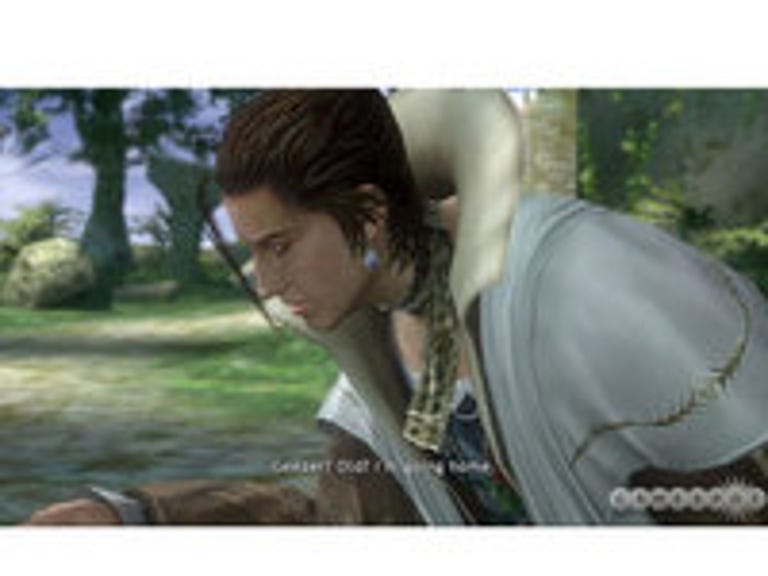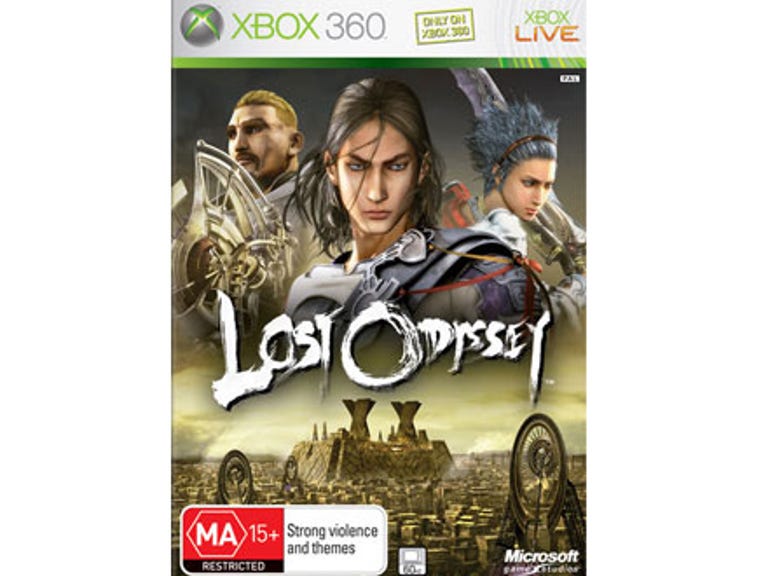 Why You Can Trust CNET
Why You Can Trust CNET Lost Odyssey review: Lost Odyssey
Lost Odyssey doesn't rewrite the rules for turn-based role-playing games, but its great story and minor formula tweaks will keep you entertained.
Lost Odyssey doesn't push any role-playing game boundaries, though that won't come as a shock to anyone familiar with Mistwalker's previous game, Blue Dragon. However, in the case of the developer's newest effort, that isn't always a bad thing. Yes, there are times when it feels like more of a relic than it does a true next-generation game, particularly in light of the tweaks made by other modern Japanese RPGs such as Persona 3 and Eternal Sonata. Yet while it may borrow liberally from the genre's older gems, Lost Odyssey is a game worth playing, most notably for its fascinating story and its brooding protagonist, Kaim.
The Good
The Bad
The Bottom Line

Kaim, along with several other characters in Lost Odyssey, is immortal, though the origin of his immortality is left purposefully unclear at the outset of the game. It's hard to get a handle on Kaim at first; he's the strong, silent type, the prototypical moping hero with a soulful scowl and a deep well of unfathomable secrets. The game takes its time with his character development, but as information slowly unfolds, it's hard not to empathise with his internal struggles. But he doesn't struggle alone, and Lost Odyssey doesn't neglect the rest of its fascinating cast. Lady pirate Seth, kind queen Ming, the noble Tolten, and several others provide ample companionship, and their lives intersect in some surprising--and not so surprising--ways. It's a serious tale, but comic relief is plentiful, and most of it comes from inadvertent spy Jansen, a flamboyant ladies' man who manages to be both annoying and irresistibly charming.
Lost Odyssey is about its characters, not about its plot. In fact, the main story follows a more or less predictable path, pitting you against a villain you spend half the game knowing very little about. No, it's about self-discovery and the timelessness of the relationships we develop. Kaim and his immortal companions unlock memories during the course of the game, and they are presented in simple but effective sequences in which the memory is recounted via stylised text, accompanied by pretty static images and subtle music cues. It makes for a good amount of reading, but if you skip past these memories, you will miss the game's most touching and heartfelt moments. The main story doesn't often reach those same heights, and a good number of the game's countless cutscenes ramble aimlessly and end up feeling like filler. Yet Lost Odyssey's concluding hours, as predictable as they are, make you feel, and that alone makes this a saga worth experiencing.
This yarn takes place in a fully realised fantasy world in the midst of revolution both political and magical. On your journey you'll certainly see your share of clichéd caves and forests, but there are plenty of beautiful vistas to behold: rocky seaside cliffs, looming castles swarming with mysterious spirits, and portside towns with colourful cobbled streets. Lost Odyssey's art design clicks, from Kaim's lazy strand of hair to detailed enemy-character models. The depth-of-field blurring that stuck out in Blue Dragon is used more subtly and to greater effect here, particularly during the game's most dramatic scenes. On the technical side, the game isn't quite as strong. The framerate is inconsistent, and the game hitches noticeably during game play and cut-scenes, even during on-screen events that wouldn't seem to tax the Unreal 3 engine, such as the map overview that occurs prior to region transitions. You will also experience some loading times between areas and before cutscenes, and while they are semi-frequent, they aren't excessively long.
Thankfully, the game is an aural delight, and it owes a lot to its pretty soundtrack. Some of the soundtrack is predictable, like the Final Fantasy-tinged battle music, although that's not too surprising when you consider that the score was created by long-time FF composer Nobuo Uematsu. Still, many of the tracks are stand-outs. In particular, the atmospheric strains played during unlocked memories are wonderfully moody and match the text perfectly. The English voice acting isn't bad, and Jansen, Ming, and Kaim are particularly well voiced. On the other hand, Mack and Cooke are acted with the usual hyperactive hamming that child characters so often fall victim to. Regardless, there are other language options, so if you'd rather listen to the original Japanese voice cast, you have the alternative.
The game play itself doesn't reach the same zenith as the story, though it's solid in and of itself. Combat is your standard turn-based affair, though there are some twists, chief among them the aim rings. Any character can wear a ring that confers upon its wearer one or more bonuses, such as a chance of inflicting poison, extra damage against spirit enemies, and so on. This isn't so special on its own, but the effectiveness of the bonus is completely reliant on your actions in battle. Whenever you order a party member to perform a standard attack, a circle will appear around your target while a larger one encircles the screen. To receive the full benefit of your ring, you hold a trigger down to shrink the larger circle and release it when it has shrunken to the size of the smaller one. The better your timing, the more potent the bonus, and if you are too far off, you don't get any benefit at all. You craft the rings yourself with ingredients you can purchase from merchants or find in the spoils of battle, and it's as simple as heading into the game menus and choosing which ring you wish to fashion. The bonuses themselves don't seem all that potent on their own, but equipping the right rings against the right enemies, along with the subtle effects of other items and spells, can have real consequences in battle.
Another addition to the combat is the defensive bonus applied to characters positioned in the back of your formation by way of the strength of those in front. As front-facing combatants get attacked, that bonus depletes, which makes attacks against those in the rear more powerful--and this applies to your enemies as well as to your own party. This gives way to some interesting spells and abilities, along with some tactical considerations, given that you can't always easily do damage to the powerful spellcaster in the back without first weakening the lesser enemies in the front. Of course, there are other considerations in play, such as attacking enemies that have an elemental affiliation with a spell of the opposing element. Nevertheless, both rings and guard bonuses are slight but welcome additions to the formula.
Unsurprisingly, spells and abilities are the most important facets of Lost Odyssey's battles. Be prepared: Many of these battles are challenging, so you'll need to have a tight grip on each character's unique skills. Mere mortals have more or less predetermined skill sets, so their roles in combat are generally obvious. On the other hand, immortals have just a few innate skills; instead, you need to learn more of them from mortals by linking to them and battling together until the immortal has gained use of them. Once every available character has joined your party, this brings up some unique possibilities. Is it worthwhile to bench one mortal in favor of another, simply in order for Seth to earn a desirable spell, even if that mortal isn't the right choice for your current circumstance? Do you bring in another immortal, knowing he will revive after defeat in a few turns, and forgo an active link for the time being? Either way, Lost Odyssey finds a pleasant balance between preset character roles and player-controlled development.
Although these additions are welcome, they aren't groundbreaking, and other aspects of the game are decidedly old-fashioned to a fault. Gameplay outside of combat feels sluggishly paced to the point of boredom. At one point, you'll have to endure two yawn-inducing fetch quests in a row; a short time later, you'll light a series of torches in a mini-game of sorts that reduces the emotional impact of the surrounding scenes and feels pointless. In another section, you must sneak past security robots, and should you make a mistake, you get sent back to the beginning of the section and must endure the same dialogue again. Other annoyances crop up as well, such as an area littered with holes that are hard to see; if you fall into one, you're sent back to the start of the dungeon. Many of these elements take a bit of time to complete, but none of them are much fun.
Getting the most out of Lost Odyssey will require a bit of patience, even from those used to the slower pace of the genre. However, the gameplay subtleties and character-driven narrative are rewarding enough to make it worth the occasional frustration. No, the game breaks no new ground, but if you stick with it, you'll find a compelling emotional drama, delicate adjustments to an age-old formula, and a unique and balanced skill-development system. Kaim's journey is a memorable one, and if you like turn-based RPGs, you'll want to experience it for yourself.
Editor's note 02/19/08: After posting this review GameSpot found that load times in the review version of Lost Odyssey were significantly longer than those in the retail game. We have amended the review accordingly and regret the original error.
